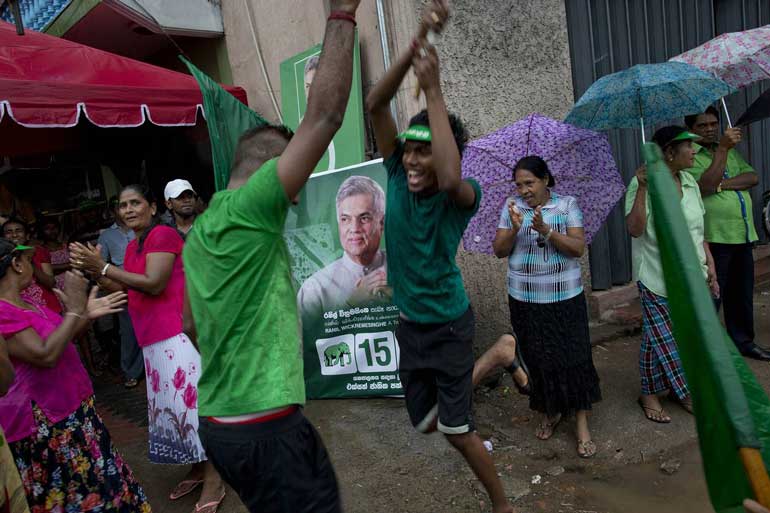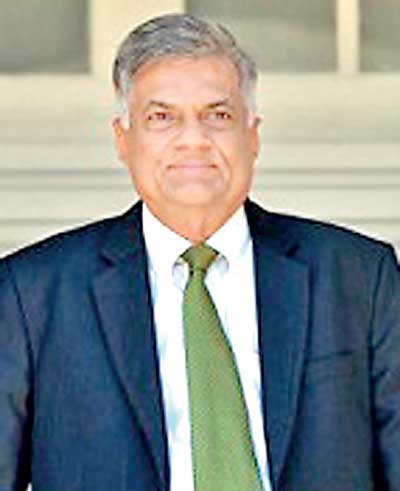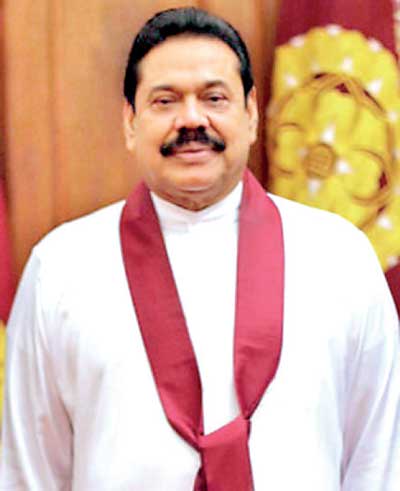Saturday Feb 21, 2026
Saturday Feb 21, 2026
Thursday, 27 August 2015 00:00 - - {{hitsCtrl.values.hits}}


Prime Minister Ranil Wickremesinghe received a record 500,566 preference votes in Colombo District. Such a groundswell will help him deaden criticisms that have dogged his political career since the early 1990s – that of being a perennial loser

Mahinda Rajapaksa, the former President, has more than his pride to swallow. The general election is the second drubbing in a year for Rajapaksa, the so-called “warrior king” who dominated Sri Lankan politics with muscle for nearly a decade
By Marwaan Macan-Markar
Nikkei Asian Review: On the morning after Sri Lankans voted in their general election, the smell of sulphur was hanging in the air outside a sprawling building in a Colombo suburb. It was the residue of firecrackers lit to echo the jubilant mood within the building – the headquarters of the United National Party, which bagged the most seats in the 225-member Parliament.
This triumph had been forecast by the party’s strategic political bureau – a team of wonks who had packed a small room in the rear of the compound and tapped voter sentiment across Sri Lanka for weeks via 12,500 party agents. One senior operative of this closely-guarded bureau told the Nikkei Asian Review 10 days before the 17 August election that the UNP was set to secure 108 seats in Parliament. Their confident outlook was proved correct, though the party missed the forecast by two seats, gaining in fact 106.
Nevertheless, they are numbers to savour. The voters’ verdict sees the moderate and right-of-centre UNP receiving a mandate to govern after spending 17 of the last 20 years filling the Parliament’s opposition benches. The more than five million votes it received – representing 45.66% of the ballots cast – was also an endorsement for the status quo, since the UNP has been running a fragile caretaker government for seven months following a presidential election in January.
“The verdict is a refreshing breath for this country, because the people want to take forward the concept of good governance,” Daya Pelpola, the UNP’s legal adviser, told the NAR. One of the main pillars the party campaigned on was good governance, along with transparency and inclusive politics, just as it had with a political coalition at the January polls. “Sri Lanka’s political map has shifted.”
His boss, UNP Leader and Prime Minister Ranil Wickremesinghe, is a personal beneficiary of that shift. The 66-year-old political veteran received a record 500,566 preference votes in the Colombo District. Such a groundswell to Wickremesinghe will help him deaden the criticisms that have dogged his political career since the early 1990s – that of being a perennial loser at the polls and a cold, out-of-touch patrician.
Diminished ‘warrior king’
On the other hand, Mahinda Rajapaksa, the country’s former President, has more than his pride to swallow. The general election is the second drubbing in a year for Rajapaksa, the so-called “warrior king” who dominated Sri Lankan politics with muscle for nearly a decade.
The current scenario is one that few dared to imagine on the eve of 8 January, when the all-powerful president sought an unprecedented third term from the 15 million registered voters and a mandate to extend his authoritarian-style grip. He lost the presidency to Maithripala Sirisena, a soft-spoken member of Rajapaksa’s own party, who led a coalition of political parties which included the UNP.
Rajapaksa’s quest for a political comeback as prime minister in the August election opened up an emotive fault line during the campaign. The 69-year-old campaigned as if his January defeat had never happened, with all the chest-thumping rhetoric he is known for. His spin ranged from playing up what the military achieved during his Government – defeating the Tamil Tiger rebels in 2009 and ending a bloody 30-year civil war – to portraying himself as the best defender of the country’s majority Sinhalese-Buddhist community.
But this appeal proved to have reached its limits, with the party which he headed as de facto leader, the United People’s Freedom Alliance, receiving 4.73 million votes – a drop of more than a million from the 5.79 million ballots it received seven months ago. That translated into 95 seats in Parliament, down from the 144 seats Rajapaksa secured as the war-winning leader at the 2010 general elections.
The election results mean the country can breathe a collective sigh of relief as they regard the new political landscape beyond Rajapaksa’s heavy-handed style of governance.
“This month’s election was more of a consolidation of the electoral gains in January, which was to move beyond divisive politics,” says Gehan Gunatilleke, Research Director at Verite Research, an independent think tank. “It is an indication that the majority in the country has moved away from the Rajapaksa slogans.”
Sri Lanka’s minority ethnic groups, which accounted for 30% of the votes cast, further broaden the contours of the electorate. The UNP’s gains in the polls were underpinned by support from Tamil and Muslim strongholds in the many multi-ethnic pockets across the country, as was the case for Sirisena in January.
“The larger issues of existence have pushed minorities towards the UNP,” says Javid Yusuf, a former member of the Human Rights Commission of Sri Lanka, a national rights watchdog.
Time to compromise
Yet neither President Sirisena nor Premier Wickremesinghe can afford to sit back in triumph and watch Rajapaksa lick his political wounds. The political foundations that these elections have laid need to be built upon with a spirit of compromise, and these leaders need to form a coalition government for political stability. The two appear to have established a cordial working relationship during the seven-month caretaker administration.
Going forward, Wickremesinghe has to depend on Sirisena’s allies in the UPFA and other smaller parties to give him numbers in the Legislature, since his UNP fell just short of the 113 seats needed for an outright Parliamentary majority. Little wonder, therefore, that some international agencies are jittery. “(A) coalition government will make effective policymaking hard to achieve,” remarked economic research consultancy Capital Economics in a post-elections assessment.
But such political math discounts the deals already being struck by the parties sitting in the new Parliament, including a historic agreement signed on 21 August by the UNP and the major bloc in the UPFA to form a national government. Another confidence booster for the UNP comes from the backing of a Tamil nationalist party, with 16 seats, and a left-wing party, with 6 seats, to take on any Parliamentary challenges posed by the Rajapaksa faction in the UPFA.
The first test of that will be the selection of the speaker, when the Parliament begins its sessions in September. Another test will be the UNP’s promised political reforms to strengthen independent institutions, which were steamrolled during the Rajapaksa administration.
Free trade clashes
The UNP’s election manifesto, however, provides clues to possible clashes that lie ahead with hardline Sinhala nationalists, whose causes include economic nationalism. After all, the UNP, which supports free markets, has pledged to push ahead with the Comprehensive Economic Partnership Agreement (CEPA), a free trade agreement between India and Sri Lanka that includes goods, services and investment, as part of its vision to boost foreign direct investment, expand Sri Lankan exports by 500% (from its current $11 billion), and increase job creation.
While one pillar of the CEPA – trade – was implemented in 2000, the other two – services and investments – have been pummelled by protests led by Sinhala nationalists and local industrialists. “It took some courage for the UNP to include CEPA in its manifesto,” says Rohan Samarajiva, Head of LIRNEasia, a Colombo-based economic think tank. “They realised there is a need to embed Sri Lanka in global value chains to help our economy, and you cannot do so without such agreement.”
A similar showdown is likely when Sri Lanka receives a United Nations Human Rights Council report in September, detailing alleged war crimes that were committed by government troops and the Tamil Tigers during the final stages of the war. Some observers expect Rajapaksa to adopt a prominent role in this, given his boasts that he is willing become a martyr in order to shield troops from any international trial. “On behalf of the country, if they ask me to sit on the electric chair, I will happily do it,” he has said.
So, while the political outlook is certainly different post-election, Sri Lanka may not have seen the last of Rajapaksa. His presence as a Parliamentarian elected by the Kurunegala District still provides him with a platform to growl at his political foes. In fact, he has already been egged on by some hardliners in his bloc to take on a bigger role from the opposition benches.
Given his record, Rajapaksa could end up spoiling some of the political plans Sirisena and Wickremesinghe are laying down for a “new Sri Lanka”, and a political requiem for the now-diminished “warrior king” may have to wait a few more years.